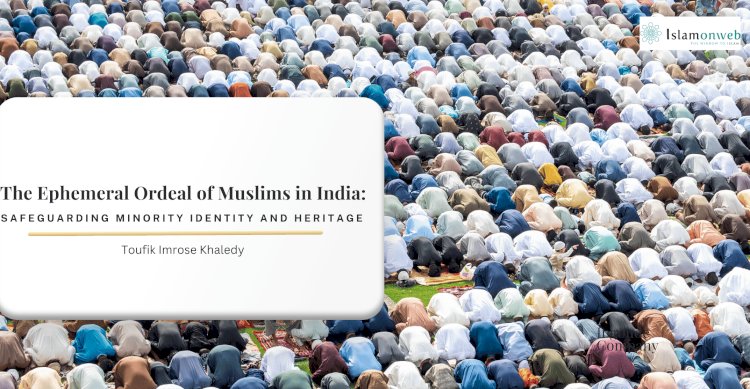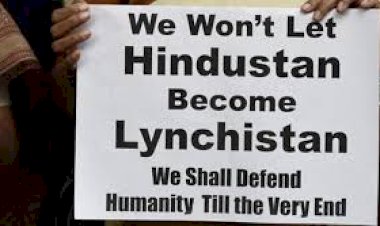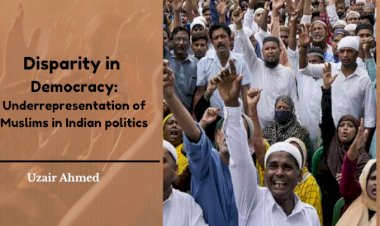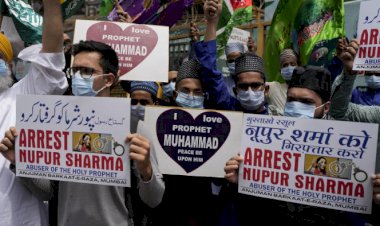The Ephemeral Ordeal of Muslims in India: Safeguarding Minority Identity and Heritage through Constitutional Rights
The Indian Constitution, often regarded as one of the world's most meticulously crafted legal frameworks, is increasingly being challenged by subversive activities and systemic erosion in contemporary India. The Constitution’s diminishing effectiveness in addressing the crises emerging from far-right Hindu nationalism has transformed the political landscape into a battleground of covert assaults, making the existence of Muslims an ephemeral ordeal. The gradual erosion of secularism, the weaponisation of legal institutions, blatant violations of fundamental rights, entrenched corruption within political and judicial bodies, arbitrary constitutional amendments, and the alarming shift from democracy to authoritarianism pose serious threats to India’s constitutional integrity.
India, once a beacon of diversity, secularism, and democracy, now teeters on the edge of an unsettling dystopia marred by unconstitutional policies pushed by Hindu nationalists. These policies have placed minorities at a crossroads—demonising them, dismantling their places of worship based on flimsy claims, and fueling a fervent wave of majoritarian support. The unabashed assertion of temple presence at disputed sites threatens the very fabric of India's pluralistic society.
For millions of Indian Muslims, the Constitution has long been a symbol of hope, resilience, and a safeguard of their rights. However, the rise of Hindu nationalist demagogues and the unchecked spread of communal hatred have intensified political discord and fractured communal harmony. This deterioration has sparked urgent concerns over the Constitution’s ability to protect minorities—especially Muslims—against the growing tide of exclusion and discrimination.
A Direct Assault on the Places of Worship Act, 1991—Fueling the Mosque-Temple Controversy
In 1991, the Indian Parliament enacted the Places of Worship Act, which mandated that the religious character of all places of worship must remain as it was on August 15, 1947—the day British India was divided into India and Pakistan. The law was introduced in response to the mass mobilisation campaign spearheaded by BJP leaders, rallying thousands of activists in Ayodhya to demand the construction of a temple at the site of the historic Babri Masjid. On the eve of the demolition, BJP stalwart Atal Bihari Vajpayee remarked in Aminabad, “There are sharp stones in Ayodhya; the ground needs to be levelled.” Despite the law’s existence, it failed to prevent the violent mob from razing the mosque in 1992—a defining moment in India’s communal history.
Three decades later, history seemed to repeat itself when a similar mosque-temple dispute in Varanasi, the parliamentary constituency of Prime Minister Narendra Modi, reached the Supreme Court in May 2022. Chief Justice D.Y. Chandrachud, rather than outright rejecting the case based on the Places of Worship Act, allowed an archaeological survey without consulting the executive. Though he assured that the site’s status would not be altered, he asserted that its “original character” could always be determined. This verdict, rather than resolving the dispute, opened Pandora’s box, setting a dangerous precedent for future challenges to Muslim religious sites.
In the last three years, Hindu nationalist groups and activists have inundated Indian courts with petitions, claiming that Muslim places of worship were built atop razed Hindu temples. The provocative slogan “Babri to bas jhanki hai, Kashi-Mathura baki hai” (Babri was just a trailer; Kashi and Mathura are next) has become a chilling war cry, reinforcing an aggressive agenda.
Beyond legal battles, a disturbing wave of attacks and demolitions on mazars (Sufi shrines) and graves has swept across India, often with state complicity. Notable incidents include:
- The demolition of seven mazars in Mathura (2018) under orders from Yogi Adityanath’s government.
- The razing of a mazar in Barabanki (2021).
- The demolition of a mazar in Kanpur (2022) by government authorities.
- The vandalisation of the mazars of Jalal Shah, Bhureshah, and Qutub Shah in Bijnor.
- Similar incidents reported in Gujarat and Uttarakhand.
The year 2022 alone witnessed the demolition of over 12 Mazars, marking a stark escalation in the targeted erasure of Muslim religious heritage.
On November 19, a local court in Sambhal, Uttar Pradesh, heard a petition alleging that a Harihar Temple had been converted into a mosque in 1529. The petition, led by advocate Vishnu Shankar Jain, called for the Archaeological Survey of India (ASI) to assume full control of the site. Jain and his associates have been at the forefront of several similar petitions, including those concerning mosques in Varanasi, Mathura, and Agra, alleging that Hindu temples once stood at these locations.
The escalating communal tensions turned violent in Sambhal after a court-ordered survey of the Shahi Jama Masjid sparked protests. The Uttar Pradesh government responded with a crackdown, shutting down internet services, closing schools, and tightening security. Amid the unrest, three Muslim men—Naeem, Bilal, and Noman—were killed, with the death toll rising to four after a 19-year-old succumbed to his injuries, according to local media reports.
Just days later, on November 27, a civil court in Ajmer issued notices to the Ajmer Dargah committee, the Union Ministry of Minority Affairs, and the ASI, following a petition by Vishnu Gupta, national president of the Hindu Sena, claiming that the Ajmer Dargah was originally a Shiva temple.
What began as mob violence over allegations of Muslims carrying beef has now escalated into lynchings, targeted Islamophobic hate speeches, and systemic discrimination. Calls for boycotting Muslim businesses, denying them rental properties, and bulldozing their homes—often sanctioned by state authorities—have become disturbingly frequent. Under the directives of chief ministers and local administrators, the campaign of economic and social disenfranchisement has left 1.54 lakh establishments affected, displacing thousands and depriving countless Muslims of their livelihoods.
Waqf (Amendment) Bill 2024: Undermining the Fundamentals of the Indian Constitution
At a rally in Gurugram in September, Union Home Minister Amit Shah announced that the Waqf (Amendment) Bill, 2024 would be passed in the upcoming winter session of Parliament. The declaration sparked immediate outrage, drawing criticism from opposition leaders, civil society members, and—most significantly—the Muslim community, the largest minority in India.
A closer examination of the Bill reveals its detrimental impact on waqf administration. While it claims to address the powers of State Waqf Boards, in reality, it strips them of their existing authority. Key administrative powers, such as determining waqf property status, removing encroachments, and overseeing waqf property registration, have been transferred to district collectors—effectively sidelining Waqf Boards.
One of the most contentious aspects of the Bill is the proposed renaming of the Waqf Act, 1995, to the “Unified Waqf Management, Empowerment, Efficiency and Development Act, 1995.” This change appears arbitrary and unnecessary, raising concerns about the intent behind rebranding an Act that has functioned under its original title for decades.
The Bill also controversially seeks to appoint non-Muslims to Waqf Boards while paradoxically barring them from creating a waqf or donating the property to a waqf, as it requires the donor to be a practising Muslim for at least five years. This selective application of inclusion—granting decision-making powers to non-Muslims while restricting their participation in waqf creation—contradicts fundamental rights and the spirit of the Constitution.
Furthermore, the Bill proposes inserting new sections (3A, 3B, and 3C), significantly altering the definitions and nature of waqfs under Section 3 of the Act. These changes aim to restructure the waqf administration, raising concerns about government overreach and the potential dilution of waqf autonomy.
The insertion of additional terms such as Collector, government organisation, government property, portal, and database within the Waqf (Amendment) Bill 2024 signals an underlying bureaucratic encroachment into waqf administration. By transferring the surveying of waqf properties to revenue authorities, who are already burdened with census duties, social surveys, voter list preparations, and other government-mandated tasks, the Bill introduces a misguided and impractical approach that could delay or obstruct the efficient management of waqf lands.
A particularly alarming provision is the removal of Section 107 of the Waqf Act, 1995, under Clause 41 of the proposed amendment. Section 107 currently protects waqf properties from the provisions of the Limitation Act 1963, ensuring that no claim of ownership can be made against them based on prolonged possession. Deleting this safeguard would expose waqf properties to encroachment, making their recovery significantly more difficult.
Similarly, the Bill seeks to revoke Section 108A, which gives the Waqf Act precedence over other laws. This change would further weaken the legal standing of waqf properties, leaving them susceptible to legal challenges and state-led appropriations.
Another crucial alteration is the amendment of Section 109, which curtails the role of State governments in framing rules for waqf administration. The amendment instead empowers the Central government to dictate regulations, effectively stripping State Waqf Boards of their autonomy and centralising control. Such a move contradicts the spirit of decentralisation and raises concerns about political interference in religious endowments.
An effective and transparent waqf administration requires dedication, accountability, and committed governance from its stakeholders, not excessive bureaucratic intervention. The Waqf (Amendment) Bill 2024, rather than enhancing waqf management, appears to undermine its independence and contradict the fundamental ideals of the Constitution.
Resisting the Renaming Trend: Constitutional Safeguards for Muslim Heritage and Cultural Identity
The BJP’s persistent push to rename places has once again come under scrutiny, sparking concerns over its political and cultural implications. The latest example is Karimganj in Assam, which is set to be renamed Sribhumi. Assam’s Chief Minister, Himanta Biswa Sarma, a staunch Hindutva advocate, justifies this decision by claiming that Rabindranath Tagore, upon visiting the area a century ago, admired its lush surroundings and suggested the name Sribhumi. However, renaming Karimganj based on this anecdotal reasoning signals a contentious shift that undermines Assamese Muslim identity.
The relabeling of Karimganj is more than just a change in nomenclature; it represents a subtle but deliberate erosion of the diverse cultural fabric that the Indian Constitution seeks to uphold. Such actions violate the spirit of Article 14, which guarantees equality before the law and prohibits discriminatory actions targeting specific communities. By disproportionately affecting Muslim heritage, this move raises constitutional concerns.
Furthermore, Article 29(1) of the Indian Constitution explicitly protects the rights of minority communities to preserve their distinct cultural identity. Renaming historically significant locations associated with Muslims could be seen as an attempt to erase their cultural footprint, thus infringing upon this fundamental right.
The State Reorganization Act, 1956, mandates procedural norms for renaming places, including public consultation and local consensus. If such steps are bypassed, or if the renaming process is perceived as an instrument of cultural erasure, it may not only be unconstitutional but could also be challenged through judicial review.
Safeguarding Muslim heritage is not just a matter of preserving names; it is about protecting the principles of inclusivity, diversity, and constitutional integrity that define India’s national identity.
The Relevance of the Indian Constitution and the Responsibility of the Supreme Court
The Indian Constitution stands as a monument to the nation’s freedom struggle, embodying the sacrifices made by people across caste, creed, and religion against the oppressive British Raj. It is not just a legal document but a blueprint for justice, equality, and liberty, ensuring that democratic values remain protected. The fundamental rights enshrined within it form the backbone of India’s governance, designed to uphold individual liberty, social justice, and equal opportunity.
The Constitution serves as a safeguard against corruption, social injustices, violent crimes, and all other forms of lawlessness that threaten India’s pluralistic identity. At the heart of its enforcement lies the Supreme Court, the highest custodian of justice. Beyond merely resolving disputes, the Court functions as a bulwark against tyranny, oppression, and the erosion of fundamental rights.
The promises of justice, liberty, and equality embedded in the Constitution are not mere rhetorical ideals; they are living guarantees for every citizen. This responsibility is reinforced by Article 32, which empowers individuals to directly petition the Supreme Court for the enforcement of their fundamental rights.
With its critical duty of upholding the Constitution and ensuring the rule of law, the Supreme Court is more than a judicial institution—it is a sentinel of justice, a protector of democratic values, and the moral compass of the nation. In times of political turbulence and social unrest, its role becomes even more vital in preserving constitutional integrity and safeguarding the rights of all Indians, particularly the marginalised and oppressed.
About the author:
Toufik Imrose Khaledy is a PG Scholar in the Department of Civilizational Studies at Darul Huda Islamic University, Kerala, India. He belongs to a small village in Murshidabad, West Bengal. The core areas of his research are identity formation, Indian Muslims, and the everyday life of rural Muslims in Murshidabad.
Disclaimer
The views expressed in this article are the author’s own and do not necessarily mirror Islamonweb’s editorial stance.
























Leave A Comment